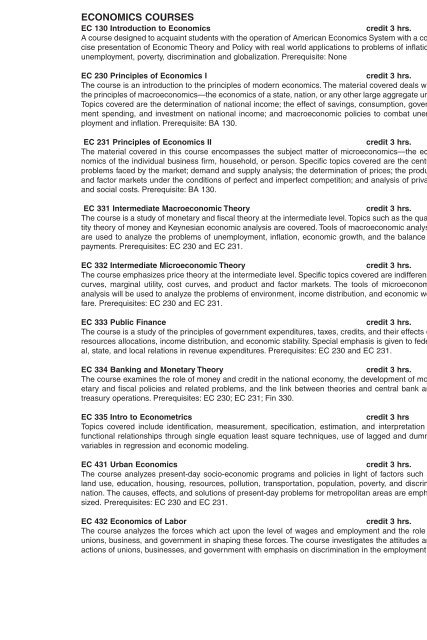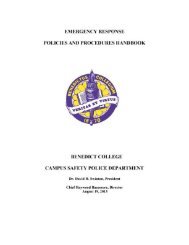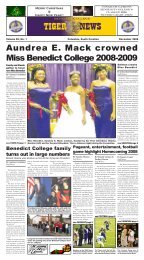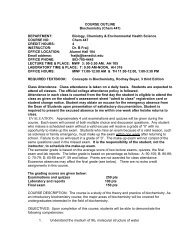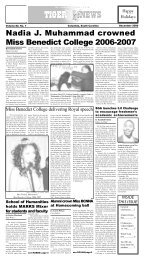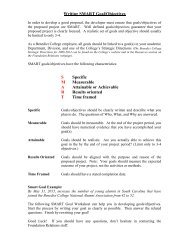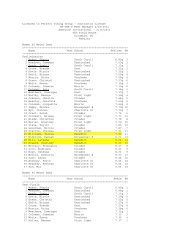2009-2011 - Benedict College
2009-2011 - Benedict College
2009-2011 - Benedict College
You also want an ePaper? Increase the reach of your titles
YUMPU automatically turns print PDFs into web optimized ePapers that Google loves.
86 BUSINESS AND ECONOMICS<br />
ECONOMICS COURSES<br />
EC 130 Introduction to Economics<br />
credit 3 hrs.<br />
A course designed to acquaint students with the operation of American Economics System with a concise<br />
presentation of Economic Theory and Policy with real world applications to problems of inflation,<br />
unemployment, poverty, discrimination and globalization. Prerequisite: None<br />
EC 230 Principles of Economics I<br />
credit 3 hrs.<br />
The course is an introduction to the principles of modern economics. The material covered deals with<br />
the principles of macroeconomics—the economics of a state, nation, or any other large aggregate unit.<br />
Topics covered are the determination of national income; the effect of savings, consumption, government<br />
spending, and investment on national income; and macroeconomic policies to combat unemployment<br />
and inflation. Prerequisite: BA 130.<br />
EC 231 Principles of Economics II<br />
credit 3 hrs.<br />
The material covered in this course encompasses the subject matter of microeconomics—the economics<br />
of the individual business firm, household, or person. Specific topics covered are the central<br />
problems faced by the market; demand and supply analysis; the determination of prices; the product<br />
and factor markets under the conditions of perfect and imperfect competition; and analysis of private<br />
and social costs. Prerequisite: BA 130.<br />
EC 331 Intermediate Macroeconomic Theory<br />
credit 3 hrs.<br />
The course is a study of monetary and fiscal theory at the intermediate level. Topics such as the quantity<br />
theory of money and Keynesian economic analysis are covered. Tools of macroeconomic analysis<br />
are used to analyze the problems of unemployment, inflation, economic growth, and the balance of<br />
payments. Prerequisites: EC 230 and EC 231.<br />
EC 332 Intermediate Microeconomic Theory<br />
credit 3 hrs.<br />
The course emphasizes price theory at the intermediate level. Specific topics covered are indifference<br />
curves, marginal utility, cost curves, and product and factor markets. The tools of microeconomic<br />
analysis will be used to analyze the problems of environment, income distribution, and economic welfare.<br />
Prerequisites: EC 230 and EC 231.<br />
EC 333 Public Finance<br />
credit 3 hrs.<br />
The course is a study of the principles of government expenditures, taxes, credits, and their effects on<br />
resources allocations, income distribution, and economic stability. Special emphasis is given to federal,<br />
state, and local relations in revenue expenditures. Prerequisites: EC 230 and EC 231.<br />
EC 334 Banking and Monetary Theory<br />
credit 3 hrs.<br />
The course examines the role of money and credit in the national economy, the development of monetary<br />
and fiscal policies and related problems, and the link between theories and central bank and<br />
treasury operations. Prerequisites: EC 230; EC 231; Fin 330.<br />
EC 335 Intro to Econometrics<br />
credit 3 hrs<br />
Topics covered include identification, measurement, specification, estimation, and interpretation of<br />
functional relationships through single equation least square techniques, use of lagged and dummy<br />
variables in regression and economic modeling.<br />
EC 431 Urban Economics<br />
credit 3 hrs.<br />
The course analyzes present-day socio-economic programs and policies in light of factors such as<br />
land use, education, housing, resources, pollution, transportation, population, poverty, and discrimination.<br />
The causes, effects, and solutions of present-day problems for metropolitan areas are emphasized.<br />
Prerequisites: EC 230 and EC 231.<br />
EC 432 Economics of Labor<br />
credit 3 hrs.<br />
The course analyzes the forces which act upon the level of wages and employment and the role of<br />
unions, business, and government in shaping these forces. The course investigates the attitudes and<br />
actions of unions, businesses, and government with emphasis on discrimination in the employment of


